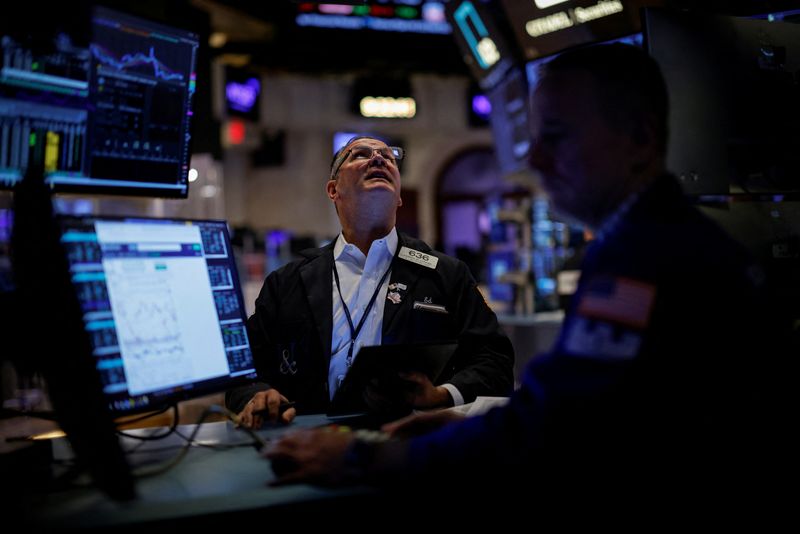By Johann M Cherian and Purvi Agarwal
(Reuters) - U.S. stocks surged on Friday, with the S&P 500 near a record high as investors cheered a crucial labor report which allayed concerns of a weakening jobs market and bet on a smaller interest-rate cut by the Federal Reserve at its next meeting.
A Labor Department report showed job growth accelerated in September and unemployment had slipped to 4.1%, further diminishing the need for the Federal Reserve to maintain large interest-rate cuts at its two remaining meetings this year.
Traders raised their bets on a 25-basis-point reduction at the Fed's November meeting to 94.5%, up from more than 71% before the data was out, according to the CME Group's (NASDAQ:CME) FedWatch Tool.
"For the economy, it means that a soft landing is happening. We continue to add jobs at a rapid clip and the unemployment rate continues to tick down," said Ross Mayfield, investment strategist at Baird.
"It means the Fed is unlikely to cut (by) 50 basis points in November or December, certainly, and maybe even take a pause in November."
The Dow Jones Industrial Average rose 258.48 points, or 0.62%, to 42,270.70, the S&P 500 gained 40.75 points, or 0.71%, to 5,740.47 and the Nasdaq Composite gained 198.25 points, or 1.11%, to 18,116.72.
The small-cap Russell 2000 index jumped 1.6%.
Nine of the 11 S&P 500 sectors trended higher, with Consumer Discretionary leading with a 1.7% rise.
The yield on two-year Treasury notes rose to 3.857% after the data's release. [US/]
Rate-sensitive growth stocks such as Tesla (NASDAQ:TSLA) added 3.6%, Amazon.com (NASDAQ:AMZN) climbed 2.8% and AI-chip giant Nvidia (NASDAQ:NVDA) rose 0.8%, lifting the Philadelphia SE Semiconductor index 2%.
Big banks also climbed, with JPMorgan Chase & Co (NYSE:JPM) adding 2.2% and Morgan Stanley (NYSE:MS) gaining 2.6%, sending the broader Banks index up 2.2%.
The labor market has been under greater scrutiny after the U.S. central bank slashed interest rates in September by a rare 50 basis points to stave off further weakening in employment.
Wall Street's main indexes were set to end October's first week flat to slightly lower, as investors remained jittery about a potential escalation in Middle East hostilities, as well as the workers' strike earlier this week.
Energy stocks such as Exxon Mobil (NYSE:XOM) and SLB climbed 0.6% each and Chevron (NYSE:CVX) crept up 0.3% as crude prices surged on worries of supply disruptions in the Middle East due to the widening conflict in the region.
The S&P 500 Energy sector is on track to log its biggest weekly jump in two years if gains hold.
Meanwhile, ports on the East and Gulf Coasts began reopening late on Thursday after workers reached a wage deal, but clearing the cargo backlog will likely take time. U.S. shares of Zim Integrated Shipping Services were down 12.5%.
Among others, Spirit Airlines nosedived 30% after a report showed the carrier was in talks with bondholders about a potential bankruptcy filing after its failed merger with JetBlue Airways.
Rivian shed 4.3% after the EV startup cut its full-year production forecast and delivered fewer vehicles than expected in the third quarter.

Advancing issues outnumbered decliners by a 2.29-to-1 ratio on the NYSE, and by a 3.35-to-1 ratio on the Nasdaq.
The S&P 500 posted 26 new 52-week highs and one new low, while the Nasdaq Composite recorded 57 new highs and 28 new lows.